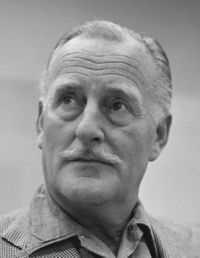John Williams
More languages
More actions
| |||||
| {{{credit}}} | |||||
| Portrays: | Statesman | ||||
| Date of Birth: | April 15, 1903 | ||||
| Date of Death: | May 5, 1983 | ||||
| Age at Death: | 80 | ||||
| Nationality: | |||||
| Related Media | |||||
|---|---|---|---|---|---|
| @ BW Media | |||||
[{{{site}}} Official Site]
| |||||
John Williams (15 April 1903—5 May 1983) was a British actor whose career began on the English stage in 1916. His appearance as a member of the Council of Twelve in both parts of the Original Series' "War of the Gods", was the last acting role of his long career.
His most famous film roles were in the Alfred Hitchcock movies Dial M For Murder (with Ray Milland) and To Catch A Thief. He was also a frequent guest on the Alfred Hitchcock Presents television series, appearing in ten episodes.
Other notable TV guest roles included a comic William Shakespeare in the Twilight Zone episode "The Bard" and the 1971 Night Gallery episode, "The Doll." During the second season of the 1966 sitcom, Family Affair, he was a temporary replacement for Sebastian Cabot in nine episodes, when an injury forced Cabot to take time off from the show.
Notes
edit- According to IMDb, his character was named "Sire Montrose". While no on-screen evidence supports this, Montrose is the name specifically given to the character in the War Of The Gods novelization by Nicholas Yermakov.
- This British actor is neither related to nor is the famous American music composer of the same name.
- He won the 1953 Tony Award for Best Supporting Actor in a Broadway play for his role in Dial M For Murder, which he would reprise in the 1954 movie version.
- He gained fame as the star of a television commercial for a set of classical music records, "120 Music Masterpieces." This became the longest running nationally broadcast commercial in U.S. television history, running for almost 14 years, from 1971-1984 (continuing to run even after his death).
External links
edit- John Williams article at Wikipedia, the free encyclopedia.


